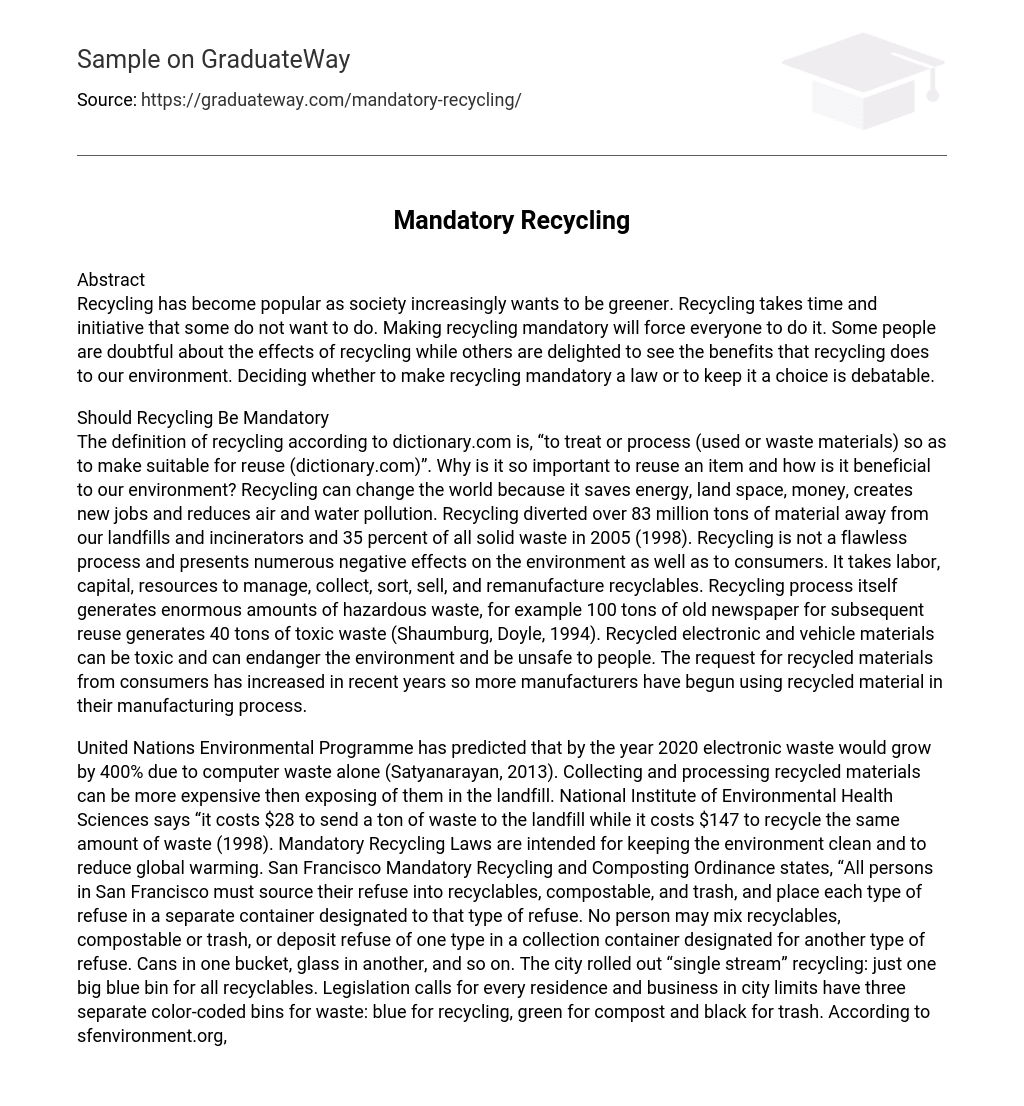Abstract
Recycling has become popular as society increasingly wants to be greener. Recycling takes time and initiative that some do not want to do. Making recycling mandatory will force everyone to do it. Some people are doubtful about the effects of recycling while others are delighted to see the benefits that recycling does to our environment. Deciding whether to make recycling mandatory a law or to keep it a choice is debatable.
Should Recycling Be Mandatory
The definition of recycling according to dictionary.com is, “to treat or process (used or waste materials) so as to make suitable for reuse (dictionary.com)”. Why is it so important to reuse an item and how is it beneficial to our environment? Recycling can change the world because it saves energy, land space, money, creates new jobs and reduces air and water pollution. Recycling diverted over 83 million tons of material away from our landfills and incinerators and 35 percent of all solid waste in 2005 (1998). Recycling is not a flawless process and presents numerous negative effects on the environment as well as to consumers. It takes labor, capital, resources to manage, collect, sort, sell, and remanufacture recyclables. Recycling process itself generates enormous amounts of hazardous waste, for example 100 tons of old newspaper for subsequent reuse generates 40 tons of toxic waste (Shaumburg, Doyle, 1994). Recycled electronic and vehicle materials can be toxic and can endanger the environment and be unsafe to people. The request for recycled materials from consumers has increased in recent years so more manufacturers have begun using recycled material in their manufacturing process.
United Nations Environmental Programme has predicted that by the year 2020 electronic waste would grow by 400% due to computer waste alone (Satyanarayan, 2013). Collecting and processing recycled materials can be more expensive then exposing of them in the landfill. National Institute of Environmental Health Sciences says “it costs $28 to send a ton of waste to the landfill while it costs $147 to recycle the same amount of waste (1998). Mandatory Recycling Laws are intended for keeping the environment clean and to reduce global warming. San Francisco Mandatory Recycling and Composting Ordinance states, “All persons in San Francisco must source their refuse into recyclables, compostable, and trash, and place each type of refuse in a separate container designated to that type of refuse. No person may mix recyclables, compostable or trash, or deposit refuse of one type in a collection container designated for another type of refuse. Cans in one bucket, glass in another, and so on. The city rolled out “single stream” recycling: just one big blue bin for all recyclables. Legislation calls for every residence and business in city limits have three separate color-coded bins for waste: blue for recycling, green for compost and black for trash. According to sfenvironment.org, residences and businesses are required to subscribe and pay for adequate trash, recycling and composting service (Cote, 2009). Any property owner or manager who fails to maintain and pay for adequate trash, recycling, and composting service is subject to liens, fines, and other fees (2012, p.45). Quality of recycled material is not always of the same quality as non-recycled materials.
Which leads to unmarketable items and loss of public confidence. Knowing that your trash is going to be recycled could make everyone feel good about the materials they are throwing away. Recycling to become mandatory would be a huge undertaking, but the world deserves the benefits that recycling has to offer. The states that have implemented a mandatory recycling law have been successful and have had a really high compliance percentage in the first month of the ordinance becoming law, but have seen a decline of compliance in the past couple of years due to complacentness. Not only will recycling improve the quality of life, but it will also decrease the amount of pollution, trash and will overall benefit the environment for future generations. Recycling is a conscientious choice people should make to better the earth. If each of us really care about the environment and are concerned, then they will recycle.
References
Cote, John (2009) S.F. Oks toughest recycling law in U.S. SFGate Retrieved from





